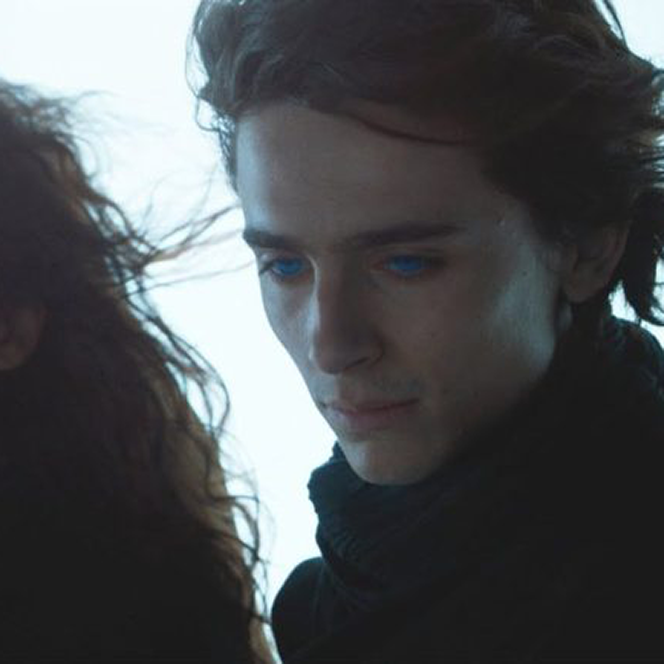Denis Villeneuve’s Dune, the first installment of a two-part adaptation of Frank Herbert’s landmark 1965 sci-fi novel, is visually stunning and thematically rich, especially for religious people. Having not read the novel or its sequels myself (despite several attempts), I steer clear of the source material controversies; but as a long-time fan of science fiction—heck, as a long-time reader of the Bible—I find the overarching religious and mythological content of Villeneuve’s film refreshing. I am in the minority of people who like David Lynch’s 1984 adaptation; but Villeneuve’s is a huge cut above, displaying work that is both innovative and of the most respectable ancient pedigree. Dune is full of material that is pertinent to Christians in the modern world, and Villeneuve’s vision has produced one of the most impressive big-screen experiences I have had in a long time, evocative of David Lean’s Lawrence of Arabia, one of Herbert’s original inspirations.
There may be some oddities in Dune to the non-sci-fi crowd. In recent days, I have witnessed more than one debate on Twitter about whether names like Paul, Jessica, and Duncan would endure more than 8,000 years from now. And some viewers may be tempted to dismiss Dune as a simple allegory for modern imperialism and petroleum wars, or as a prophecy (now a bit passé) of a clash between Islam and Christianity; but this is to miss the forest for the trees. It doesn’t really matter what the fights between House Atreides and House Harkonnen and the Padishah emperor Shaddam Corrino IV are about. Instead, as one friend told me, Dune is most of all about an enchanted cosmos. For those of us as interested in the invisible things as in the visible ones, Villeneuve provides a welcome alternative to the facile struggles at the center of most popular entertainment offerings.
The mysterious character at the center of Herbert’s and Villeneuve’s story is Paul Atreides, played by Timothée Chalamet with the same welcome understatement as Kyle MacLachlan in Lynch’s earlier film. Dune is the story of Paul’s coming of age, which intersects with his family’s new role as stewards of the desert planet Arrakis and its valuable “spice,” a hallucinogenic substance that has myriad applications, including folding space for interstellar travel. Paul’s mother, Lady Jessica, belongs to the Bene Gesserit, a sisterhood of witches whose breeding program Jessica violates to produce her son with the powerful Duke Leto. Frank Herbert’s son, Brian, who continues and curates the large Dune literary canon today, says that the Bene Gesserit are based on his father’s “Irish Catholic aunts,” who “tried to force Catholicism on him.” Paul, like Frank Herbert himself, represents a “spiritual but not religious” reaction to perceived ecclesiastical manipulation—a point of serious interest for the Catholic evangelist today.
Paul struggles to understand his special powers and his possible identity as Kwisatz Haderach, a messianic figure whose coming is meant to bring cleansing and illumination to the universe. Chalamet’s performance evokes the complexity of dealing with the mixed bag of blessings and curses from a young person’s formation as he begins to take stock of his life for himself. Here Herbert’s original story hearkens back to the mystical origin stories of Arthurian legend and looks ahead to the hero’s journey in Star Wars. Villeneuve’s film is far more interesting than recent modern Arthurian adaptations, including The Green Knight, and it beats the pants off the Star Wars prequels and sequels and their shameless tributes to technocracy.
Villeneuve depicts Paul’s development within an almost post-tech future, where people’s concerns are wealth and power, as ever, but where religion is saturated in everyday reality. The great worms of Arrakis not only deter greedy miners from taking the spice, but they move among sands where water, a universal symbol for regeneration (and obviously so for Christianity), remains deep below, inaccessible. The spice itself, originally inspired by Herbert’s experience with hallucinogenic mushrooms, may seem to Catholic viewers more like a MacGuffin, which represents hope for the world rooted in the life of the spirit instead of computer data.
Villeneuve said about the themes in Dune, “I think that as human beings we are bound to revisit the same things over and over, and that we have to find a way to freedom.” The savior trope has been a constant answer to breaking the cycle of history from time immemorial. In part two of Dune, due out in 2023, we shall have the chance to see how Herbert and Villeneuve depict their savior. Will he be a warrior king whose victory (or loss) is just another glitch in the indestructible matrix of greed and oppression? Regardless, with Dune, Christians have an opportunity to talk about how our Messiah is the fulfillment of every culture’s hope of salvation. The Christian relies on the one who breaks the bondage of worldly slavery and defeats the wicked worm, but who also reclaims and restores history itself.
It is no surprise and most welcome to hear a score from Hans Zimmer, the premier film composer alive today, who previously worked with Villeneuve on Blade Runner 2049. The acting in Dune is mostly excellent, as Rebecca Ferguson shines as Jessica alongside Chalamet, and Javier Bardem and Sharon Duncan-Brewster particularly stand out among the supporting cast. I was underwhelmed by Zendaya in the role of Chani, although part of the problem may be that she appears mostly in dream sequences, which are a bit too long and too frequent for my taste.
Small criticisms aside, Dune is a must-see. I haven’t looked forward to seeing a film on the big screen for a second time in quite a while. Nor have I begun thinking so soon about a sequel.
Maybe I’ll even take another stab at the novel.
